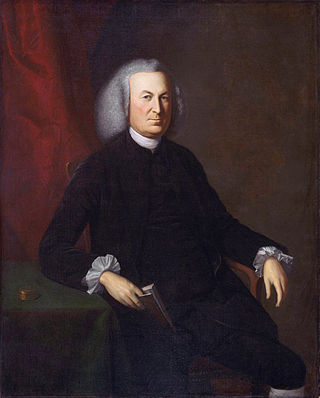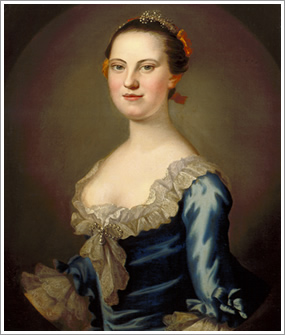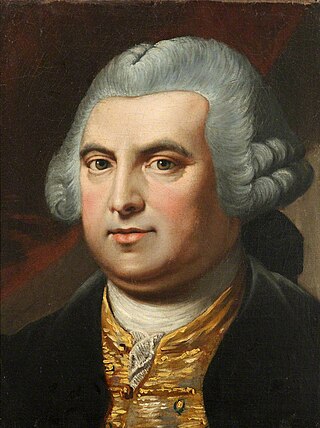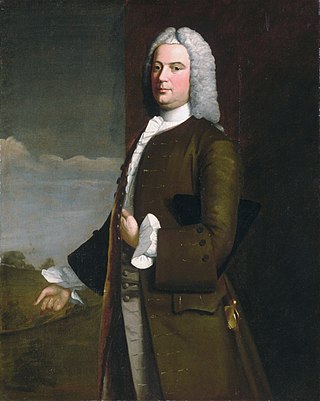
Thomas Cadwalader was an American physician in Philadelphia, Pennsylvania.

Christ Church Burial Ground in Philadelphia is an important early-American cemetery. It is the final resting place of Benjamin Franklin and his wife, Deborah. Four other signers of the Declaration of Independence are buried here, Benjamin Rush, Francis Hopkinson, Joseph Hewes, and George Ross. Two additional signers of the Declaration of Independence, James Wilson and Robert Morris, are buried at Christ Church just a few blocks away.
This article presents a timeline of events in the history of the United Kingdom from 1700 AD until 1799 AD. For a narrative explaining the overall developments, see the related history of the British Isles.

Thomas Willing was an American merchant, politician and slave trader who served as mayor of Philadelphia and was a delegate from Pennsylvania to the Continental Congress. He also served as the first president of the Bank of North America and the First Bank of the United States. During his tenure there he became the richest man in America.

Mary Willing Byrd was an American planter. At twenty years of age, she became the step-mother of five children and managed the family and household at Westover Plantation in Charles City County, Virginia beginning her second year of marriage. Together Byrd and her husband, William Byrd III, had ten more children before he committed suicide in 1777. She determined what property to hold on to and what to sell of what she inherited so that she could pay off debts, preserve Westover Plantation, and retain some land for the Byrd children.
Benjamin Tasker Sr. was the 21st Proprietary Governor of Maryland from 1752 to 1753. He also occupied a number of other significant colonial offices, including, on various occasions, being elected Mayor of Annapolis.

Edward Shippen was the second mayor of Philadelphia, although under William Penn's charter of 1701, he was considered the first.

Samuel Powel was a colonial and post-revolutionary mayor of Philadelphia, Pennsylvania. Since Philadelphia's mayoral office had been abolished early in the revolutionary period, Powel was the last colonial mayor of the city and the first to serve after the United States gained independence from Great Britain.

James Hamilton, son of the American lawyer Andrew Hamilton, was a lawyer and governmental figure in colonial Philadelphia and Pennsylvania. He served two terms as deputy governor of the Province of Pennsylvania from 1748 to 1754 and from 1759 to 1763. From 1745 to 1747, he was the mayor of Philadelphia

Tench Francis was a prominent lawyer and jurist in colonial Maryland and Philadelphia.

William Smith was an American lawyer and jurist.
Edward Shippen III was an American merchant and mayor of Philadelphia.

Edward Shippen was an American lawyer, judge, government official, and prominent figure in colonial and post-revolutionary Philadelphia, Pennsylvania. His fourth daughter, Margaret Shippen, was the second wife of Benedict Arnold.

The Livingston family of New York is a prominent family that migrated from Scotland to the Dutch Republic, and then to the Province of New York in the 17th century. Descended from the 4th Lord Livingston, its members included signers of the United States Declaration of Independence and the United States Constitution. Several members were Lords of Livingston Manor and Clermont Manor, located along the Hudson River in 18th-century eastern New York.
Gideon Cornell (1710–1766) was a farmer, trader and judge who became the first Chief Justice of the Rhode Island Supreme Court, serving from 1747 to 1749.

Thomas Willing Francis was a prominent American merchant.

Lewis Morris Jr. was an American judge, politician and landowner who served as speaker of the New York General Assembly from 1737 to 1738.

Jacob Ridgway was an American merchant and diplomat from Philadelphia. He served as Consul for the United States to Belgium during Thomas Jefferson's presidency.
Henry Bull was a colonial attorney and politician in Rhode Island.
















